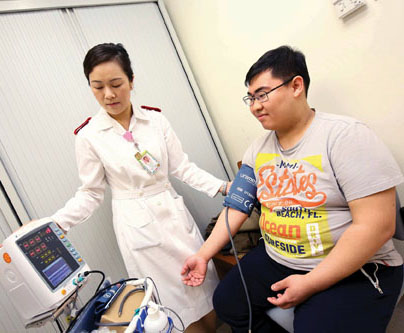
Multidisciplinary Management Team for Patients with Obese Metabolic Syndrome
Local public hospitals found every five of Hong Kong adults suffer from overweight, according to definition of the World Health Organization. Severe obesity has the potential to create or aggravate multiple complications, some of which entail increased mortality risks. At Prince of Wales Hospital, the Multidisciplinary Management Team for Patients with Obese Metabolic Syndrome is playing a major role in helping obese patients lose weight in a sustainable way by providing physical and psychological support.
Consultant (Surgery) and team leader Dr Simon Wong says it was a training experience in Australia that inspired him to begin developing the service. Historically, the primary type of bariatric surgery available in Hong Kong was laparoscopic adjustable gastric banding. In 1999, Dr Wong formed a four -person team that immediately began working on introducing other types of procedures available, including laparoscopic sleeve gastrectomies and laparoscopic gastric bypasses, which help patients to reduce their food intake. To date, the team has assisted more than 1,500 patients.
“We are not a beauty parlour that provides instant liposuction-based ‘fixes’,” Dr Wong explains. “Our aim is for a patient’s weight loss to be a healthy and sustainable process that occurs over the course of one to two years after surgery. The interdisciplinary nature of our team plays a crucial role in the success of our endeavours.” The team’s allied health professionals – including dietitians, physiotherapists and clinical psychologists – are instrumental in the process, particularly as regards psychological and long-term support.
Bariatric surgery can help patients physically reduce their food intake, patients’ food addictions and changing behavioural patterns can often be the most challenging hurdle for patients who are battling obesity. One simple strategy that the team’s clinical psychologists share with patients is to have them insert a card of weight reduction vows into their purse or wallet to serve as a regular reminder of what they want to achieve.
The team has established the first bariatric patient support group in Hong Kong, which organises a wide range of activities designed to build supportive connections among patients, medical practitioners and volunteers. One initiative of the group has been to encourage patients who have successfully lost weight to donate clothes that are now too big for them to current patients, in part to demonstrate to those who are just beginning their weight-loss journey what is possible with perseverance and time.
The team’s research nurses are responsible for following up with post-surgery patients, who usually need to take medication for an extended period of time after their operation. “Our teammates call patients regularly,” says Dr Wong.



